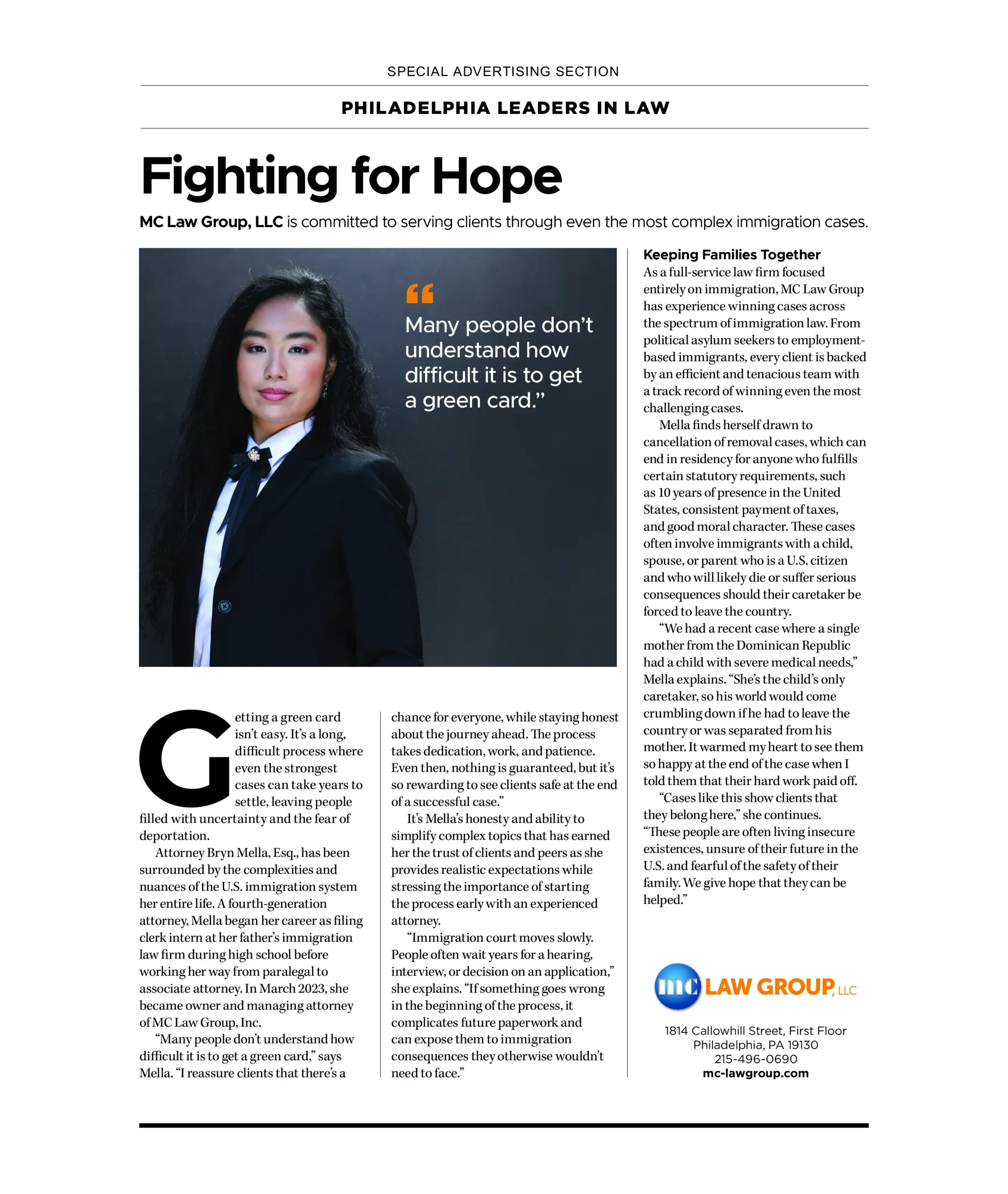Experienced Philadelphia Immigration Lawyers
Free Walk-In Consultations Available on Tuesdays, Wednesdays, and Thursdays at our Philadelphia Location — No Appointment Needed!
Prefer a phone consultation? Contact us or book your appointment online using the buttons below. *Consultation fee applies.

Multilingual Attorneys & Staff
We speak and translate: English, Spanish, Tamil, Portuguese, Tagalog, Bicolano, & Visayan.

Free In-Person Consultation
Start with a free in-person consultation — no appointment needed — every Tuesday, Wednesday, or Thursday at our Philadelphia office.

20+ Years of Experience
Our attorneys have extensive experience in immigration litigation and appeal in all state and federal courts.
Can a Lawyer Help With My Immigration Issues?
The Philadelphia immigration lawyers at the MC Law Group, LLC are committed to those who need immigration assistance in the area. We understand that the U.S. immigration system is complex. There are families that need to bring loved ones into the country and employers who need help to sponsor foreign employees. We are a full-service law firm that offers a wide range of knowledge and experience in all types of immigration cases, including family, employment, business, student, fiancé(e), and visitor-based visas, as well as green cards, citizenship, asylum applications, and deportation defense.
Our attorneys are highly proficient in practicing and appearing before the Department of Homeland Security and its components, U.S. Citizenship and Immigration Services (USCIS), U.S. Immigration and Customs Enforcement (ICE), the Immigration Courts, the Board of Immigration Appeals (BIA); and the courts of all levels.
We know that these processes are often difficult to understand or manage. Clients are urged to consult with our legal team today to learn about the services we provide. Because we handle many different issues that pertain to immigration, we welcome clients who need help in more than one area. We can help a family or company remain safe and on the right side of the law. We are also strong advocates for anyone who must navigate the immigration courts.

Your Immigration Partner
Dedicated Attorneys & Staff To Get the Results You Need
“Thank you MC Law Group for helping us with our case. They are great with details and following up with the requirements. They answered all our questions and helped us with all our concerns. Special thank you to Attorney Bryn Mella and her paralegal, Ms. Aree. I will continue to recommend MC Law Group.”
-Maribelle A.
Choose The Immigration Services You Need
When we take on an immigration case, we can help with the following:

Political Asylum
We know how to work with different government agencies on these processes, and we will give our clients progress reports as we work toward their needed political asylum.

Deportation & Removal
This process can be confusing for the family, but we will work to stop the process and ensure that our clients receive the appropriate visa so that they remain in the country.

Citizenship & Naturalization
We know that U.S. citizenship is one of the most important things that members of a family obtain. Therefore, we will work with our clients to understand what everyone is required to do.

Violence Against Women Act
When a battered spouse or child needs help with their immigration status, we can develop a case that shows the spouse needs a special visa that will protect them and their children.

National Interest Waiver
This waiver allows individuals to petition for a U.S. work visa without a traditional job offer. They must demonstrate that their work in the U.S. would benefit the national interest.

Extension of Stay
An extension of stay allows a non-immigrant visa holder to remain in the U.S. beyond their current visa expiration date. You must submit Form I-539 to USCIS before your visa expires.

Immigrant Visas
There are a number of visas for individuals and families to seek as immigrants to the United States. We can help determine the best route and guide you through the legal process.

Non-Immigrant Visas
If you're seeking assistance with a temporary visa for employment, school, visiting or doing business in the United States, we can help facilitate the process on your behalf.

1. Get a Consultation
Discuss your immigration goals with an experienced attorney.

2. Submit Documents
Provide essential documents, and let us handle the paperwork.

3. Make a Payment
Make a payment to initiate the legal process.

4. Obtain New Status
Please be patient as immigration cases often require time.
Your Path to a New Beginning
Get the Help You Need for Your Immigration Journey
When you are facing immigration and visa issues, reach out to the Philadelphia immigration lawyers at MC Law Group, LLC. We provide services for families, businesses, students, those seeking asylum, and visitors.
Phone consultations are available on Mondays and Fridays. The fee for a phone consultation is $100 and is non-refundable.
If you prefer a free consultation, visit us in person on Tuesday, Wednesday, or Thursday between 9:00 AM – 4:00 PM at our Philadelphia office.
Call us today at (215) 496-0690 or use the buttons below to schedule a phone consultation.
Located in Philadelphia, we serve clients throughout the tri-state area, including Pennsylvania, New Jersey, Delaware, Maryland, and throughout the United States.

"The team is such a pleasure to work with. My husband and I had an excellent experience with the firm from start til present. They were hands on which made a great difference, making sure we are aware and understand the entire process. Communication was seamless, and they were always available to discuss any concerns we had. We definitely recommend them to anyone looking for a reliable firm."
"Definitivamente recomiendo el firm, tengo sobre 4 años con ellos y debo decir que el camino a mi naturalizacion en este pais a sido un proceso lento pero seguro. La licenciada Wanda Alvelo quien es mi representante legal es muy profesional en lo que hace y sabe maniobrar durante el proceso basado en su experiencia para que todo vaya en la dirección correcta. No tengo ninguna queja hasta el momento pero si recomiendo paciencia ya que cada caso o proceso es distinto y pues las cosas no se dan de la noche a la mañana."
"Me siento muy agradecida con el equipo y sobre todo con Tahir que él fue el único abogado que agarró mi caso, después de que otros abogados me dijeron que no. Desde un principio él me explicó las cosas cómo iban a suceder y así fue todo yo pagué lo que desde un principio acordamos y ellos nunca mi cobraron más $ hasta que Gracias a Dios mi caso terminó y GANAMOS me aprobaron mi Green Card por Cancelation of Removal. Éste tipo de casos sólo se ganan el 3% 🙏🏽🥹😄😁 Ahora sólo estoy esperando para hacerme Ciudadana 🇺🇸 🫡. Gracias MC Law Group."
Schedule Your Consultation Below


and

